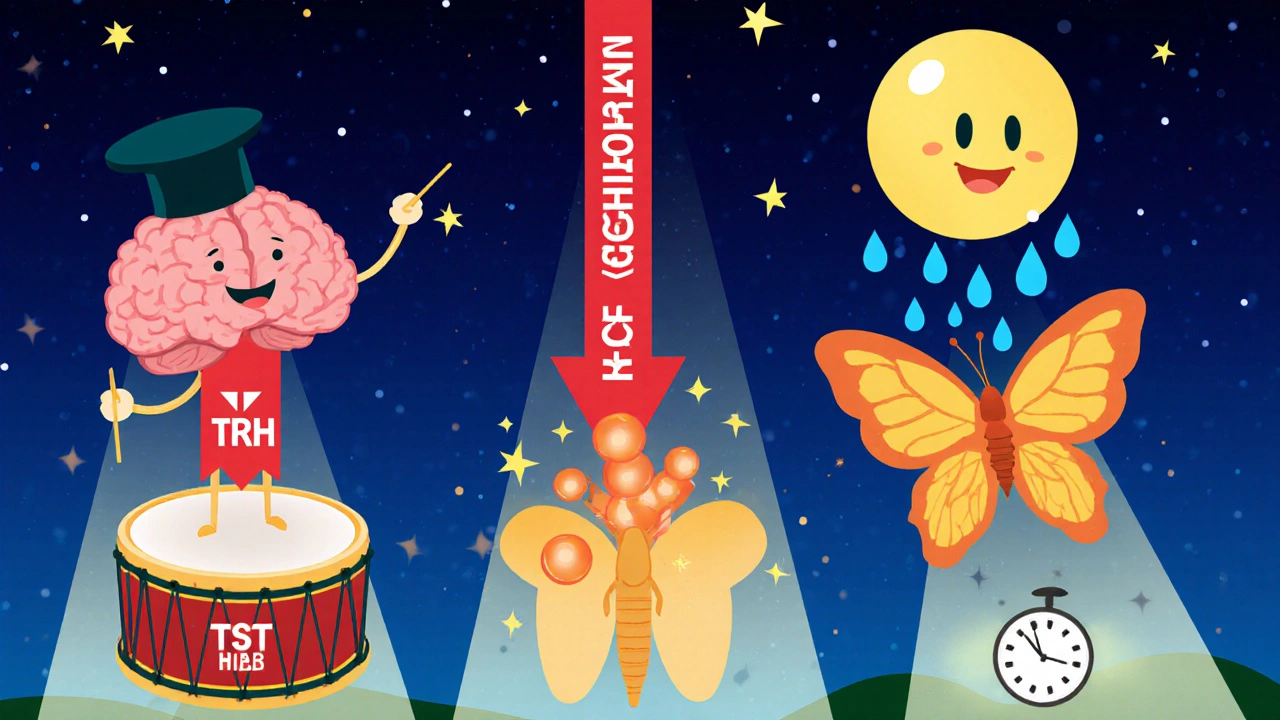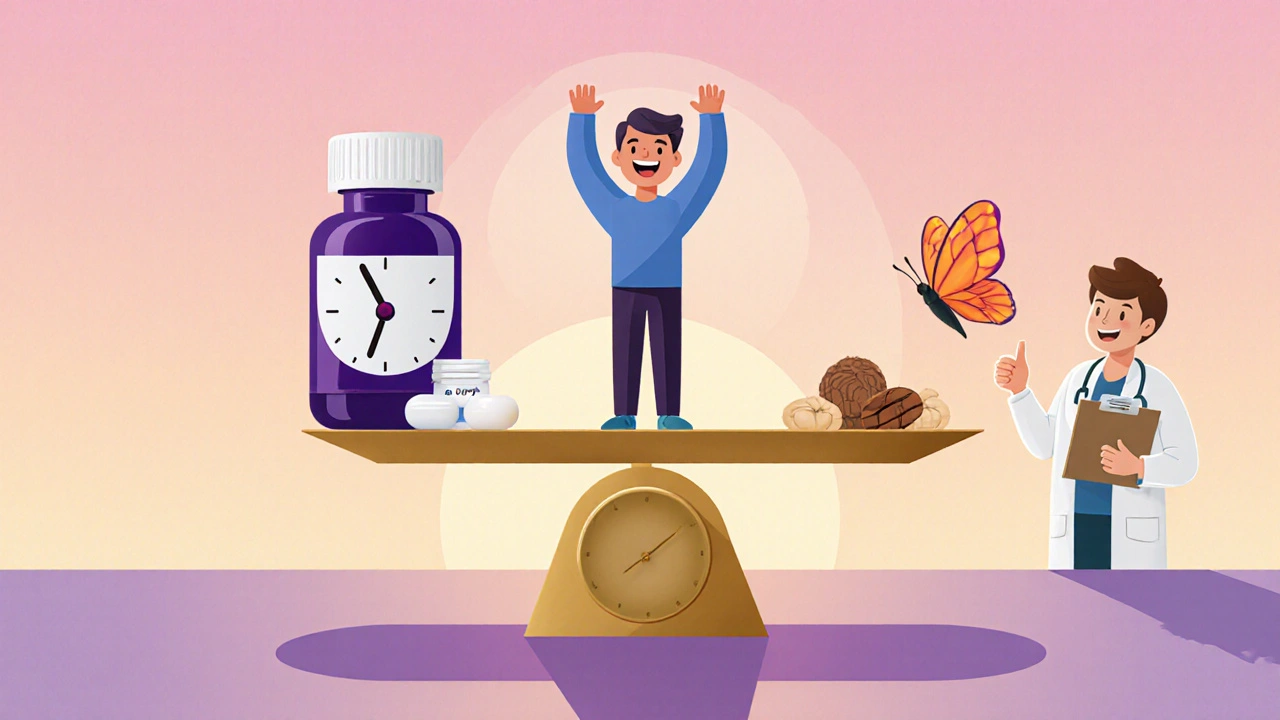Thyroid-Melatonin Effect Calculator
This calculator estimates potential changes to your TSH levels after 8 weeks of melatonin use. Results are based on clinical studies and should not replace medical advice. Always consult with your healthcare provider before starting melatonin.
Input Your Information
Results
Enter your information and click Calculate to see estimated results.
Ever wonder why a good night’s sleep sometimes seems to fix a sluggish metabolism? The answer often lies in the hidden dialogue between melatonin and your thyroid. This article breaks down what the two hormones do, how they influence each other, and what you can do to keep both systems running smoothly.
What Is Melatonin and Where Does It Come From?
Melatonin is a hormone produced by the pineal gland that regulates the body’s sleep‑wake cycle. Its secretion spikes after sundown, signaling the brain that it’s time to wind down. While most people think of melatonin only as a sleep aid, the hormone also interacts with many other endocrine pathways, including the thyroid axis.
The Thyroid Gland: A Metabolic Powerhouse
Thyroid gland is a butterfly‑shaped organ located at the base of the neck that produces thyroid hormones, primarily thyroxine (T4) and triiodothyronine (T3). These hormones control basal metabolic rate, heart rate, and even how your body uses fats and carbohydrates. When the thyroid is out of balance, you feel the effects everywhere-from energy levels to temperature regulation.
Key Players in the Thyroid‑Melatonin Conversation
- Thyroid hormone (T3 and T4) drives metabolism and influences nearly every organ system.
- Hypothyroidism is a condition where the thyroid produces insufficient hormone, leading to fatigue, weight gain, and cold intolerance.
- Hyperthyroidism occurs when the gland over‑produces hormone, causing rapid heartbeat, anxiety, and weight loss.
- Circadian rhythm is the internal clock that synchronizes sleep, hormone release, and body temperature over a 24‑hour cycle.
- Pineal gland secretes melatonin in response to darkness and is directly linked to the hypothalamic-pituitary‑thyroid (HPT) axis.
- Iodine is an essential mineral required for the synthesis of T3 and T4.
- Selenium acts as a co‑factor for the enzyme that converts T4 into the more active T3.
- Hashimoto's thyroiditis is an autoimmune form of hypothyroidism where the immune system attacks the thyroid tissue.
How Melatonin Influences Thyroid Function
Research over the past decade shows three main mechanisms:
- Regulation of the HPT axis: Melatonin can blunt the release of thyrotropin‑releasing hormone (TRH) from the hypothalamus, which in turn reduces thyroid‑stimulating hormone (TSH) secretion. Lower TSH means the thyroid dials back hormone production.
- Antioxidant protection: The hormone’s antioxidant properties help shield thyroid cells from oxidative stress, a factor in autoimmune thyroid disease.
- Interaction with circadian rhythm: Since TSH naturally peaks at night, a well‑timed melatonin surge ensures the timing aligns with the body’s natural rhythm, preventing a mismatch that could overstimulate the gland.

Clinical Evidence: What Do the Studies Say?
Several human and animal studies shed light on the melatonin‑thyroid link:
- A 2021 double‑blind trial on 84 patients with subclinical hypothyroidism found that 3 mg of melatonin nightly for eight weeks modestly lowered TSH (average drop of 0.8 µIU/mL) without altering free T4 levels.
- Rodent experiments published in 2022 demonstrated that pinealectomy (removal of the pineal gland) caused a 35% rise in serum TSH, which was reversible with melatonin replacement.
- A meta‑analysis of 7 studies (total n≈560) concluded that melatonin supplementation can improve sleep quality in hyperthyroid patients, indirectly supporting symptom management.
While the data are promising, the effect size is modest and varies by individual health status, dosage, and timing.
Practical Tips: Using Melatonin Safely When You Have Thyroid Concerns
Here’s a quick checklist you can follow:
- Choose the right dose: 0.5-3 mg taken 30‑60 minutes before bedtime is generally sufficient for sleep and for a gentle influence on TSH.
- Time it right: Aim for the same clock‑time each night. A consistent schedule respects the circadian rhythm and helps the HPT axis stay synchronized.
- Watch for interactions: High‑dose melatonin may lower TSH too much in people already on levothyroxine, potentially requiring a dose adjustment.
- Mind nutrient status: Ensure adequate iodine (150 µg/day for adults) and selenium (55 µg/day) to support thyroid hormone synthesis and conversion.
- Monitor labs: If you have a thyroid disorder, have your TSH, free T4, and free T3 checked before starting melatonin and after 6-8 weeks of use.
- Stay aware of side effects: Rarely, melatonin can cause daytime drowsiness, vivid dreams, or mild GI upset. If symptoms persist, discontinue and consult a clinician.
When to Seek Professional Guidance
If you experience any of the following, it’s time to talk to your doctor or an endocrinologist:
- Sudden weight changes not explained by diet or activity.
- Persistent fatigue despite adequate sleep.
- Palpitations, heat intolerance, or unexplained tremors.
- Signs of autoimmune disease, such as a swollen neck or persistent low-grade fever.
Professional oversight is especially crucial if you’re already on thyroid medication, pregnant, or have a chronic illness.

Summary Table: Melatonin’s Typical Effects on Thyroid Parameters
| Condition | Baseline TSH (µIU/mL) | After 8‑Week Melatonin | Clinical Significance |
|---|---|---|---|
| Euthyroid (normal) | 1.2‑2.5 | ±0.1 (no meaningful change) | Neutral - sleep benefit without hormone disruption |
| Subclinical hypothyroidism | 4.8‑6.0 | ‑0.7 to ‑1.0 | Modest improvement; may reduce need for immediate medication |
| Hyperthyroidism (treated) | 0.3‑0.5 | ±0.0 | No adverse effect; better sleep may ease symptom perception |
Key Takeaways
- Melatonin is more than a sleep aid; it subtly modulates the thyroid‑stimulating axis.
- Low‑to‑moderate doses improve sleep and may gently lower elevated TSH in subclinical hypothyroidism.
- Consistent timing, adequate iodine and selenium, and periodic lab monitoring are essential for safe use.
- Always involve a healthcare professional if you have an existing thyroid condition or are on medication.
Frequently Asked Questions
Can melatonin cure hypothyroidism?
No. Melatonin may help lower a mildly elevated TSH, but it does not replace thyroid hormone. It’s best used as a supportive sleep aid alongside proper medical treatment.
Is it safe to take melatonin if I’m on levothyroxine?
Generally, low doses (0.5‑1 mg) are safe, but they can reduce TSH slightly. Talk to your doctor; you may need a minor adjustment to your levothyroxine dose after a few weeks.
What time of day should I take melatonin for thyroid health?
Take it 30‑60 minutes before you plan to sleep, ideally at the same clock‑time each night. This respects the natural night‑time surge and aligns with the nocturnal TSH peak.
Can melatonin affect the thyroid in people without a disorder?
In healthy adults, melatonin’s impact on TSH is minimal. Most studies show no clinically relevant change, so regular use for sleep is unlikely to disturb thyroid balance.
Does stress interfere with melatonin’s effect on the thyroid?
High cortisol can blunt both melatonin secretion and thyroid hormone conversion. Managing stress-through exercise, mindfulness, or adequate sleep-enhances the beneficial interaction between the two hormones.


While the article outlines the melatonin‑thyroid interaction, it glosses over the dose‑response curve; the therapeutic window is narrower than presented, and the cited studies lack adequate power; consequently, readers may overestimate the clinical relevance. Moreover, the recommended 0.5‑3 mg range neglects inter‑individual variability, which is substantial in endocrine pharmacodynamics. The piece also fails to address potential interactions with common supplements such as calcium or iron, which can impair absorption. A more rigorous discussion of study design limitations would have been appropriate.
Sleep is overrated, just relax and let the body sort itself out.
Let me tell you why the whole melatonin‑thyroid hype is a circus of misinformation. First, the idea that a tiny hormone can magically lower TSH in subclinical hypothyroidism is nothing more than a marketing gimmick. Second, the studies cited are tiny, plagued by selection bias, and often funded by supplement companies-hardly the gold standard you’d trust for medical advice. Third, you ignore the fact that melatonin can act as a mild suppressant of TRH, which may actually worsen hypothyroid symptoms in some patients. Fourth, the timing of supplementation is treated as a one‑size‑fits‑all, while circadian rhythms are highly individualized. Fifth, nobody mentions the potential for daytime drowsiness that can impair productivity and even increase stress, which, in turn, spikes cortisol and sabotages thyroid conversion. Sixth, the article glosses over the importance of iodine and selenium, essential cofactors that dictate whether any hormonal tweak will have any effect at all. Seventh, any adjustment of levothyroxine dosage without physician oversight is reckless. Eighth, the narrative that melatonin is benign overlooks rare cases of vivid dreams and gastrointestinal upset that can derail a person’s quality of life. Ninth, the interplay between cortisol, melatonin, and thyroid conversion isn’t a simple linear pathway; it’s a tangled network that demands nuanced understanding. Tenth, the piece downplays that stress itself can blunt melatonin secretion, rendering any supplementation moot unless lifestyle factors are addressed. Eleventh, the suggestion that melatonin can replace proper sleep hygiene is absurd-good sleep hygiene is the foundation, not an after‑thought. Twelfth, the takeaway that a cheap supplement can patch hormonal imbalances is a dangerous oversimplification. Thirteenth, you’ve got to consider age‑related changes in pineal function, which affect how much melatonin an older adult can actually utilize. Fourteenth, the article fails to caution about pregnancy, where hormonal balances are already precarious. Finally, the whole premise ignores the principle of ‘first, do no harm,’ which should guide any therapeutic recommendation. In short, this isn’t a breakthrough; it’s a reminder that hormone supplementation should be approached with skepticism and professional guidance.
Great points, and to add a bit of context: the homeostatic feedback loops governing the HPT axis are highly sensitive to exogenous melatonin. When you introduce an exogenous source, you’re essentially modulating the set‑point, which can lead to downstream adaptations. In clinical practice, we often monitor not just TSH but also free T4 and T3 to gauge the net effect. Consistency in timing helps maintain circadian fidelity, reducing the risk of desynchronization. So, while caution is warranted, a judicious, low‑dose regimen can be integrated into a comprehensive thyroid management plan.
That makes sense. Consistent timing is key and watching labs helps keep everything balanced.
Honestly, the whole melatonin‑thyroid fanfare is just another Hollywood‑style health trend. Folks think they’re discovering a secret weapon, but the evidence is as thin as a runway model. It’s definetly not a replacement for solid medical care. And let’s not forget, over‑the‑counter hype rarely survives rigorous scrutiny. Real health-especially for Americans-needs real science, not flashy buzzwords.
Consider the philosophical notion that sleep itself is a micro‑cosm of the universe-a period where entropy briefly subsides. In that vein, melatonin serves as a subtle conductor, aligning biological rhythms with cosmic order. Yet, when we attempt to manipulate such a delicate system without full comprehension, we risk discord. Therefore, any intervention should be rooted in empirical rigor, acknowledging both the elegance and fragility of endocrine harmony.
Absolutely! Keep the conversation positive and remember that small, consistent steps-like a steady bedtime routine-can make a big difference. Stay motivated and keep listening to your body.
Let me be crystal clear: the United States has always led the world in health innovation, and any suggestion that a cheap supplement could replace proper medical oversight is downright reckless! This melatonin narrative tries to undermine the rigorous standards that American physicians uphold. We must protect our citizens from pseudo‑science that threatens national health excellence!!!
Respectfully, while national pride is admirable, the focus should remain on evidence‑based practice. Monitoring thyroid panels, ensuring adequate iodine and selenium, and consulting endocrinologists are essential steps regardless of geographic context.